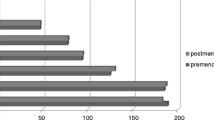Abstract
Background
Metabolic syndrome (MetS) is on the rise due to the epidemic increase of obesity. It increases the risk of atherosclerotic cardiovascular diseases and type II diabetes mellitus.
Aims
To study the prevalence of MetS and its components in premenopausal and postmenopausal women.
Design
Cross-sectional comparative study.
Material and Method
Five hundred premenopausal women and 500 postmenopausal women in the age group 40–65 years, attending OPD of Obstetrics and Gynecology Department of Pt. J.N.M. Medical College, Raipur from September 2012 to August 2014 were analyzed and assessed for the MetS risk factors and evaluated according to the NCEP ATP III criteria.
Results
The prevalence of MetS in postmenopausal women was 48.6 %, nearly 1.7 times the prevalence in premenopausal women (27.4 %). Except for central obesity and low HDL cholesterol, the frequency of hyperglycemia, high blood pressure, and hypertriglyceridemia were significantly higher in postmenopausal than in premenopausal women. All the five factors of NCEP ATP III criteria were present in 5 % of postmenopausal women in contrast to 0.4 % in premenopausal women.
Conclusion
Prevention is better than cure. The need of the hour is to target premenopausal women who are at risk of developing MetS in their postmenopausal age. It will delay and prevent them from future morbidities.
Similar content being viewed by others
References
Unni J. Third consensus meeting of Indian menopause society (2008): a summary. J Mid-life Health. 2010;1:43–7.
Beigh SH, Jain S. Prevalence of metabolic syndrome and gender differences. Bioinformation. 2012;8(13):613–6.
Carr MC. The emergence of the metabolic syndrome with menopause. J Clin Endocrinol Metab. 2013;88(6):2404–11.
Ritu M, Manika M. Impact of intervention with Co-Enzyme Q10 on homocysteine levels of cardiac patients with established angiographic evidence. J Clin Trial Cardiol. 2014;1(2):1–6.
Shah D. The Annual conference of the British menopause society. J Midlife Health. 2010;1:48–50.
Pandey S, Srinivas M, Agashe S, et al. Menopause and metabolic syndrome: a study of 498 urban women from Western India. J Midlife Health. 2010;1(2):63–9.
Jesmin S, Islam AS, Akter S. Metabolic syndrome among pre- and post-menopausal rural women in Bangladesh; result from a population-based study. BMC Res Notes. 2013;6(1):157.
Ali SB, Belfki-Benali H, Aounallah-Skhiri H et al. Menopause and metabolic syndrome in Tunisian women. Bio Med Res Int, 2014, Article ID 457131, 7 pages, 2014.
de Figueiredo Neto JA, Figuerêdo ED, Barbosa JB, et al. Metabolic syndrome and menopause: cross-sectional study in gynecology clinic. Arq Bras Cardiol. 2010;95(3):339–45.
Heidari R, Sadeghi M, Talaei M, et al. Metabolic syndrome in menopausal transition: Isfahan healthy heart program, a population based study. Diabetol Metab Syndr. 2010;2:59.
Christian DS, Kathad MM, Bhavsar BS. A clinico-epidemiological study on health problems of postmenopausal women in rural area of Vadodara District, Gujarat. Natl J Med Res. 2012;2(4):478–80.
Madhukar S, Gaikwad V, Sudeepa D. A community based study on perceptions about menopausal symptoms and quality of life of postmenopausal women in Bangalore rural. Int J Health Sci Res. 2012;2(3):49–56.
Palacios S, Henderson VW, Siseles N, Tan D, Villaseca P. Age of menopause and impact of climacteric symptoms by geographical region. Climacteric. 2010;13:419–28.
Selvaraj I, Gopalakrishnan S, Logaraj M. Prevalence of metabolic syndrome among rural women in a primary health centre area in Tamil Nadu. Indian J Public Health. 2012;56(4):314–7.
Prakash A, Prakash J. Metabolic syndrome and its components: a hospital based study from north India. Indian J Med Spec. 2013;4(1):22–8.
Lavanya KM, Thomas V, Muralidhar NR. Metabolic syndrome (Ms) among adults in urban slums, a cross sectional study in Hyderabad, Andhra Pradesh, India. J Community Med Health Educ. 2012;2:192.
Marjani A, Moghasemi S. The metabolic syndrome among postmenopausal women in Gorgan. Int J Endocrinol, 2012, Article ID 953627: 2012: 6.
Mendes KG, Theodoro H, Rodrigues AD, et al. Menopausal status and metabolic syndrome in women in climacteric period treated at a clinic in Southern Brazil. Open J Endocr Metab Dis. 2013;3:31–41.
Jouyandeh Z, Nayebzadeh F, Qorbani M, et al. Metabolic syndrome and menopause. J Diabetes Metab Disord. 2013;12:1.
Compliance with ethical standards and conflict of interest
This study was a cross sectional comparative study. Informed and written consent from all the participants was taken and all procedures followed were in accordance with ethical standard of the responsible Committee on human experiments (institutional and national) and with the Helsinki Declaration of 1975, as revised in 2008(5). Abha Singh and Neha Singh declared that they have no conflict of interest.
Author information
Authors and Affiliations
Corresponding author
Additional information
Dr. Mrs Abha Singh is a Director Professor and HOD at Pt. J.N.M. Medical College, and Dr. Neha Sinha is a Postgraduate Student at Pt. J.N.M. Medical College.
Rights and permissions
About this article
Cite this article
Singh, A., Sinha, N. Metabolic Syndrome: Can We Keep Check?. J Obstet Gynecol India 66, 466–470 (2016). https://doi.org/10.1007/s13224-015-0713-x
Received:
Accepted:
Published:
Issue Date:
DOI: https://doi.org/10.1007/s13224-015-0713-x




